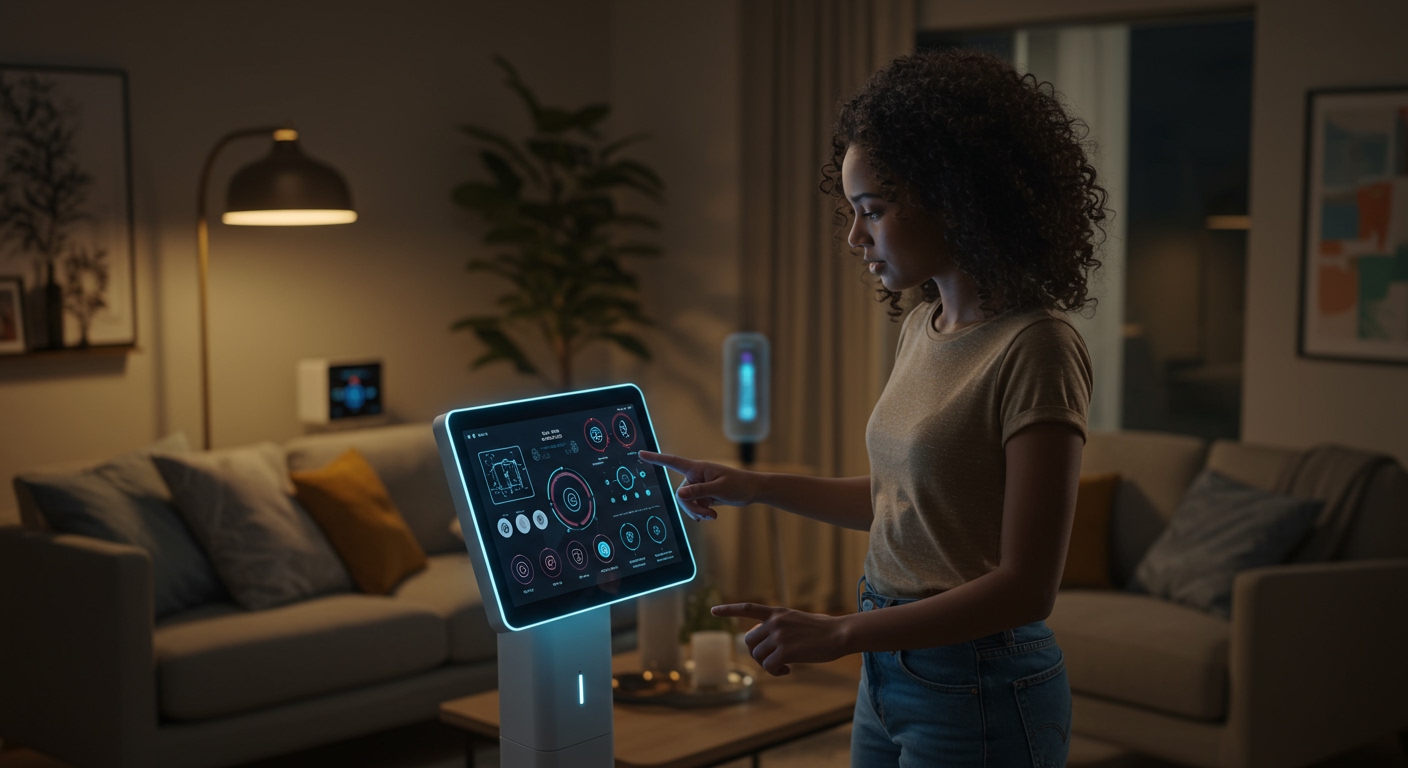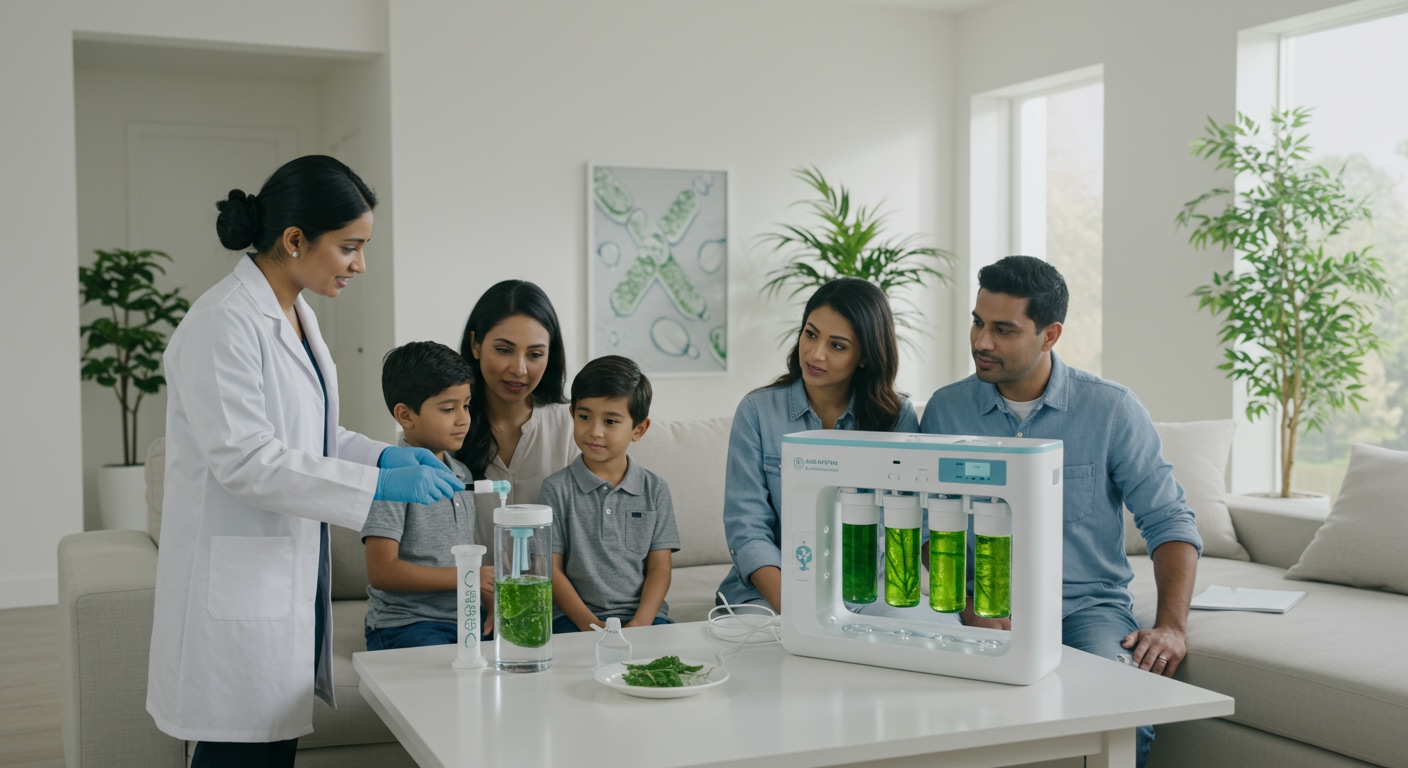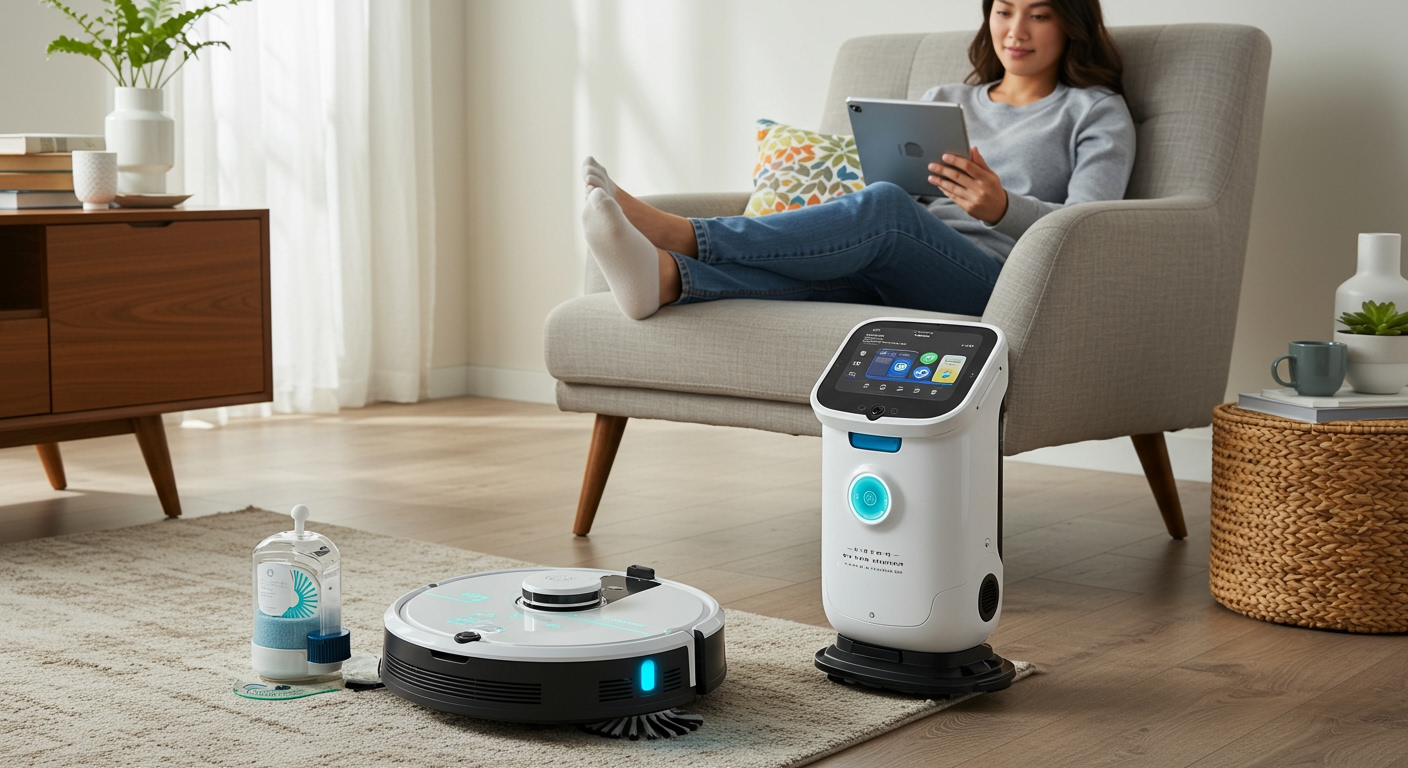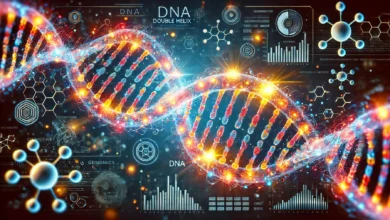From Lab Bench to Living Room: How Biotech is Changing Life at Home
From Lab Bench to Living Room: How Biotech is Changing Life at Home
Personalized health, sustainable food, eco-friendly home products – these aren’t just buzzwords. Breakthroughs in biotechnology are actively shaping your daily life in these areas and more. It’s time to explore the exciting future of home biotech.
Key Points
- Biotechnology is moving beyond labs, profoundly impacting daily home life through direct consumer applications.
- Personalized health is emerging through at-home diagnostics, genetic testing, and wearable technology for continuous monitoring and preventative care.
- Sustainable food innovations like cultured meat, precision fermentation, and enhanced crop varieties are reshaping diets and addressing global food challenges.
- The home environment benefits from eco-friendly biotech solutions in cleaning products, self-healing materials, and advanced air/water purification systems.
- Personal care and beauty products are increasingly leveraging bio-engineered ingredients for improved efficacy, sustainability, and microbiome balance.
- Ethical considerations surrounding data privacy, equitable access, and environmental impact are crucial as biotechnology integrates further into society.
A new era for biotechnology is dawning, bringing its power directly into our homes.
For decades, biotechnology largely remained behind laboratory doors, the exclusive domain of scientists in lab coats making groundbreaking discoveries. Yet, in recent years, this powerful field has quietly, yet profoundly, begun to integrate into the very fabric of our daily home lives. From the food on our plates to the air we breathe and the products we use, biotech innovations are subtly but surely reshaping our living spaces and personal routines in ways once only imagined in science fiction.
This integration represents a profound shift, taking sophisticated scientific applications out of specialized labs and putting them directly into the hands of consumers. It’s a testament to the rapid pace of innovation, fueled by breakthroughs in genomics, synthetic biology, and bioengineering. As these technologies become more accessible and miniaturized, their potential for home use is exploding. This promises a future where our homes are more than just places to relax; they become dynamic hubs for personalized health, sustainable living, and enhanced well-being.
Getting discoveries from the lab bench into our living rooms isn’t just about bringing new products to market. It’s a profound transformation, reshaping convenience, efficiency, and sustainability in our daily lives. We’re now empowering individuals with tools and insights once exclusive to medical professionals or large industries. This effectively weaves cutting-edge science directly into the fabric of modern home life.
Redefining Health and Wellness, Right in Your Home.
Perhaps no area demonstrates biotechnology’s profound impact more clearly than personal health and wellness. The traditional healthcare model, largely centered on hospital and clinic visits, is steadily transforming. Thanks to biotech innovations, we’re seeing a shift towards a more proactive, personalized, and home-based approach. This evolution empowers individuals, letting them monitor their own health, manage chronic conditions, and even gain diagnostic insights—all without leaving home.
The most impactful technologies are the ones that quietly integrate into our daily routines. They become so deeply embedded that we eventually stop seeing them as ‘technology’ at all—they’re just how life works.
Precision Health: Tailoring Care Through Advanced Diagnostics
At-home genetic testing kits have made personal genetic insights widely accessible to everyone. Now, you can explore your ancestry, identify potential predispositions to certain health conditions, and even understand how your body might respond to medications. While these tests certainly require careful interpretation, they mark a crucial step towards truly personalized health strategies.
Rapid diagnostic tests, extending far beyond genetics, are now increasingly common. Consider the range: from COVID-19 antigen tests to at-home urinary tract infection (UTI) kits and glucose monitors. These clever tools deliver immediate results, empowering quicker decision-making and earlier intervention. Then there’s wearable technology. Often integrating tiny biosensors and sophisticated algorithms, these devices offer continuous monitoring of vital signs, sleep patterns, and activity levels. They provide a steady flow of personal health data, helping individuals make informed lifestyle choices and spot potential issues before they escalate.

Crafting healthcare specifically for you, informed by advanced diagnostics.
These tools fundamentally change how individuals engage with their health. Instead of passively receiving care, people become active partners in managing their well-being, paving the way for a more preventative and personalized approach.
Innovative Treatments and Proactive Wellness
Looking ahead, biotechnology promises even smarter ways to manage our health right from home. Consider gene therapy: though still complex, it could eventually offer more accessible, highly targeted treatments for genetic conditions. We’ll also see the rise of smart drug delivery systems, such as ingestible sensors or patches that dispense medication based on real-time bodily data. These innovations are set to significantly improve how effectively treatments work and how consistently patients follow their regimens.
The field of microbiome science is booming, and it’s bringing us personalized probiotics and prebiotics. These are designed to fine-tune gut health. We now understand this plays a crucial role in our overall well-being, immune system, and even mental state. This kind of innovation points to a future where preventing health issues isn’t just a concept; it becomes a tangible, everyday practice, thanks to breakthrough biotechnology.
Revolutionizing the way we grow, distribute, and enjoy our food.
Biotechnology is fundamentally reshaping the way we produce and eat our food. As we confront global challenges like climate change, a growing population, and dwindling resources, biotech offers groundbreaking solutions. It’s helping us build food systems that are not only more sustainable and nutritious, but also more ethical – impacting everything from farm to fork.
Cultivating Our Sustainable Food Future
Cultured meat, grown directly from animal cells instead of through traditional livestock farming, is undoubtedly one of the most talked-about food innovations today. It holds immense promise: think significantly less land and water needed, far fewer greenhouse gas emissions, and a complete absence of animal welfare concerns. While still in its early stages of widespread availability, this technology has the power to fundamentally transform our relationship with meat.
Precision fermentation, for instance, is a truly groundbreaking technique. It allows us to produce dairy proteins, egg whites, and other food components directly from microorganisms, completely bypassing the need for animals. The result? Animal-free alternatives that are molecularly identical to their traditional versions, offering consumers sustainable and often allergen-friendly choices. Alongside this, vertical farming, frequently enhanced by biotechnology to optimize plant growth, brings fresh produce much closer to urban centers. This not only slashes transport costs but also significantly reduces our environmental footprint.
Sustainable Food: Growing and Sourcing Responsibly
Beyond addressing environmental concerns, these methods also create a food supply chain that’s both more stable and efficient, significantly reducing its susceptibility to the unpredictable challenges of conventional farming.
Richer, more complete nutrition.
But biotechnology’s impact doesn’t stop at sustainability. It’s also transforming our food by enhancing its nutritional content. Consider biofortification: this process uses genetic engineering to significantly increase the vitamin and mineral levels in staple crops, directly addressing nutritional deficiencies in vulnerable populations. Furthermore, scientists are working to reduce common allergens in foods like peanuts or gluten, making meals safer and more accessible for everyone.
Imagine crops that can easily shrug off pests, diseases, and even extreme weather. By precisely adjusting their genetic makeup, we can create these robust new varieties, leading to a much more stable and diverse food supply. Ultimately, this means families everywhere will have more reliable access to healthy, nutritious food.
Bringing Biotech Home: How It’s Shaping Our Daily Lives
Our homes are no longer just shelters. They’re transforming into dynamic environments where biotechnology is increasingly at work, helping us maintain cleanliness, purify the air, and even enhance the very materials around us. This evolution isn’t just futuristic; it’s guiding us toward more efficient and environmentally conscious living spaces.
Sustainable Cleaning and Earth-Friendly Supplies
Many traditional cleaning products rely on harsh chemicals. But biotechnology offers a greener path forward. Enzyme-based cleaners don’t just mask messes; they actively break down dirt and stains, doing so more effectively and with a far smaller environmental footprint. No wonder these enzyme-powered solutions are quickly gaining traction. They not only clean remarkably well but are also significantly less toxic, creating a safer home environment for both people and pets.
We’re also seeing bio-engineered materials pop up in construction and our everyday lives. Take self-healing concrete, for instance, which uses embedded bacteria to repair its own cracks. Or consider bioplastics, made from renewable resources, that are completely biodegradable. These breakthroughs hold the potential to make our homes more sustainable, incredibly durable, and far less dependent on petroleum.

Making Air and Water Safe and Clean
Biotechnology is quietly enhancing our home environments, from the air we breathe to the water we drink. Consider indoor air purification: new biofilters employ microorganisms to effectively break down volatile organic compounds (VOCs) and other airborne pollutants. Unlike traditional HEPA filters, these systems offer a more natural, energy-efficient approach. The result? Healthier indoor spaces, a significant benefit for anyone with allergies or respiratory sensitivities.
When it comes to water, new microbial purification systems and biosensors are already making our tap water safer by precisely detecting contaminants. Imagine future innovations: small, household bioreactors that could treat and purify water right at the faucet for any need. This would drastically cut down our dependence on bottled water and harsh chemical treatments.
New Horizons in Personal Care and Beauty
Driven by a desire for more effective, sustainable, and personalized solutions, the personal care and beauty industry has eagerly embraced biotechnology. Bio-engineered ingredients, in particular, are at the heart of this transformation.
Consider cosmetic ingredients. Many, once sourced from animals or petrochemicals, are now produced via fermentation. This method offers sustainable, vegan alternatives. Common skincare components like hyaluronic acid, squalane, and various peptides are often engineered this way, ensuring both superior purity and consistent quality.
Our growing understanding of the skin’s microbiome is transforming skincare. A new generation of products is emerging, designed not just to cleanse, but to balance and nourish the beneficial bacteria on our skin. This innovative approach, powered by biotechnology, aims to foster healthier skin from the inside out. The result? A more resilient, vibrant complexion.
Considering the Ethics, Shaping the Future
While home biotech offers tremendous promise, its widespread adoption inevitably raises significant ethical, societal, and regulatory questions. A top concern is data privacy, especially when handling sensitive genetic and health information. Furthermore, ensuring fair access to these advanced technologies is vital to prevent them from widening existing health disparities.
When we introduce bioengineered products and organisms into ecosystems, their long-term environmental impacts demand careful consideration and regulation. The pace at which these innovations become part of our daily lives will largely depend on public understanding and acceptance. This is why clear communication and education are crucial for people to make informed decisions.
Navigating Ethics, Shaping Tomorrow
Even with the challenges ahead, one trend is undeniable: biotechnology is set to become an even more integral part of our daily lives, right within our homes. Expect to see more advanced diagnostic tools, for instance, or highly personalized nutrition plans informed by your body’s live metabolic data. We’ll also likely encounter smart materials that intuitively adapt to our needs, and perhaps even living spaces designed to interact directly with our biology. Ultimately, the home of the future could quietly become a seamless extension of a personal health hub – a space that effortlessly supports our health, enhances our well-being, and promotes a sustainable lifestyle.

Ultimately, our future looks increasingly shaped by biotechnology.
Biotechnology has made an extraordinary journey. It’s moved from the precise confines of the lab right into the familiar comfort of our living rooms. This isn’t just a scientific leap; it’s a profound evolution in human innovation. What was once abstract science is now rapidly becoming an indispensable part of our daily lives, influencing everything from how we care for our bodies and nourish ourselves to how we maintain our homes.
What’s driving this quiet revolution? It’s a combination of tireless scientific inquiry and a growing desire for solutions that are personalized, sustainable, and efficient. As biotechnology continues to mature, expect its influence to increasingly weave into our daily lives. This opens up remarkable opportunities: from improving our health and caring for the environment, to simply enhancing our overall quality of life. The biotech-powered home isn’t some far-off fantasy; it’s rapidly becoming a tangible part of our modern world.
Frequently Asked Questions
What does ‘personalized medicine’ truly mean, especially when we consider its implications for home biotech?
Imagine healthcare perfectly shaped just for you. That’s the core idea behind personalized medicine, especially with innovations in home biotech. It means taking into account your unique genetic blueprint, your daily habits, and even your surroundings. This approach often involves at-home genetic tests to assess disease risk, understanding how your genes impact medication effectiveness, and continuous monitoring via wearables. These devices provide real-time health insights, enabling truly tailored support.
When it comes to sustainable eating at home, how exactly is biotechnology making a difference?
Biotechnology plays a crucial role in making our home food supply more sustainable. Think of innovations like cultured meat, which requires far less land and water than traditional livestock farming. Or consider precision fermentation, a process that creates proteins and other essential ingredients without needing any animal inputs at all. Beyond these, biotechnology also helps us grow food more efficiently by developing drought-resistant crops and advanced vertical farming techniques, making domestic food production both more productive and much kinder to the environment.
As home biotech grows more prevalent, what ethical considerations should we be exploring?
Absolutely, we face significant ethical challenges. A primary concern revolves around data: how do we protect sensitive genetic and health information? Beyond privacy, there’s the crucial question of fair access – ensuring these advancements truly benefit everyone, regardless of their background. We also need to consider the potential misuse of genetic data, the impact on natural ecosystems, and the long-term societal changes brought about by highly personalized technologies.




